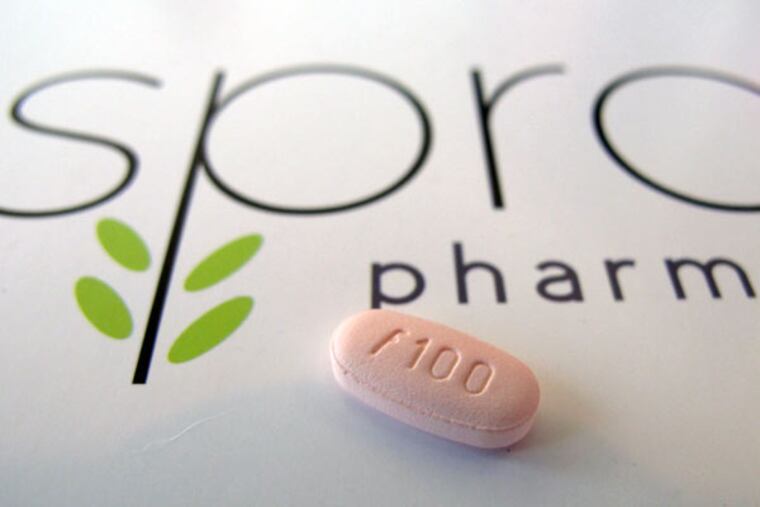FDA approves drug to boost women's libido
The U.S. Food and Drug Administration on Tuesday approved the first medication for women with low libido, but added so many safety precautions that its market may be limited.

The U.S. Food and Drug Administration on Tuesday approved the first medication for women with low libido, but added so many safety precautions that its market may be limited.
The controversial and twice-rejected drug, flibanserin, to be marketed as Addyi (pronounced add-ee), could be available by mid-October, said the maker, Sprout Pharmaceuticals. It is approved only for use by premenopausal women, and can be prescribed only by doctors trained about risks, including interactions with alcohol and common prescription drugs.
"Today's approval provides women distressed by their low sexual desire with an approved treatment option," Janet Woodcock, director of the FDA's drug evaluation and research center, said in a statement. "Because of a potentially serious interaction with alcohol, treatment with Addyi will only be available through certified health-care professionals and certified pharmacies."
Sprout hailed the decision as a victory for women. After the FDA's last denial of approval in 2013, the Raleigh, N.C., company and its allies created an Internet-based advocacy campaign dubbed eventhescore.org that accused regulators of sexism and a double standard.
"It has been a remarkable journey to get to this breakthrough moment," said Sprout CEO Cindy Whitehead. "We applaud the FDA for putting the patient voice at the center of the conversation, and for focusing on the scientific evidence."
The decision was denounced by a coalition of women's health activists, who believe the FDA was right the first two times: Flibanserin's risks - including drowsiness, fainting, and low blood pressure - outweigh its marginal effectiveness.
"This is a triumph of marketing over advocacy," said Cynthia Pearson, head of the National Women's Health Network. "Women don't have enough information to accurately assess the risks of this drug."
Because of concerns and remaining questions, the FDA is requiring Sprout to conduct three studies to assess the alcohol risk. In June, the company presented results of a small alcohol interaction study - but 23 of the 25 subjects were men, because, the company said, it had trouble recruiting women who are moderate drinkers.
Patients will have to sign a "patient-provider agreement form" saying they have been informed of potential dangers.
Pharmacies certified to dispense Addyi also will have to counsel patients to avoid alcohol, and can only fill prescriptions from certified prescribers.
The product will have a boxed warning about alcohol, and also many common prescription drugs, including antifungals, antibiotics, and antidepressants.
"So many hoops to jump through. It's hard to see how many women will qualify" for a prescription, said Leonore Tiefer, a New York University psychiatrist and sex therapist who is a critic of eventhescore.org. "I wish [the FDA] had just rejected it and been done with it, but it seems like they just couldn't stomach the reaction."
One of Sprout's paid consultants, Sheryl Kingsberg, a clinical psychologist at University Hospitals Case Medical Center in Cleveland, disagreed.
"This is the most important advance in women's health since the pill was approved in 1960!" Kingsberg wrote in an email. "Approval of Addyi will help my patients and millions of women who will now know that they have a right to treatment for their sexual dysfunction."
In its own safety proposals before approval, Sprout said the product labeling should advise women to quit the drug if it does not work within 12 weeks. The FDA changed that to eight weeks.
The company also promised not to do any direct-to-consumer advertising for the first 18 months, to give doctors time to learn about the drug.
The current staples of treatment for female sexual problems are psychotherapy and testosterone supplements.
At an FDA advisory committee meeting in June, dozens of women and doctors offered testimony about the need for better options. Drug companies, too, have been hotly pursuing a "pink Viagra" since the little blue pill for men was approved in 1998.
But female sex disorders have turned out to be far more difficult to define and quantify, let alone fix, than erectile dysfunction, which can be treated by improving blood flow. And while eventhescore.org claims men have dozens of approved sex drugs - an exaggeration that infuriates the campaign's critics - even men do not have an approved drug for low libido, medically known as "hypoactive sexual desire disorder."
Unlike Viagra, which is taken only as needed, flibanserin must be taken daily, and indefinitely.
Flibanserin, originally researched by the German pharmaceutical firm Boehringer Ingelheim as an antidepressant, works on three brain chemicals.
Boehringer sold the rights to flibanserin to Sprout after the drug fell short in two major trials as a low-libido treatment.
Undeterred, Sprout did another big 24-week trial, in which flibanserin was slightly better than a placebo on both crucial measures - increasing desire and the number of "satisfying sexual events."
Flibanserin increased monthly sex episodes by one more than a placebo.
The FDA rejected the drug in 2013 because, in rare but unpredictable cases, it can trigger low blood pressure or fainting, or both, and alcohol can increase those risks.
After Sprout appealed the rejection, the FDA agreed to reconsider the drug if the company did studies to evaluate the dangers.
The results of those studies troubled the FDA's advisory committee, even though the panel recommended approval. Three out of 26 women given antifungals fainted or had low blood pressure, including one who became unresponsive and had to be rushed to a hospital. Those dangerous reactions also occurred in three out of the 25 people given high doses of alcohol with flibanserin.
The FDA has consistently denied gender bias.
215-854-2720 @repopter